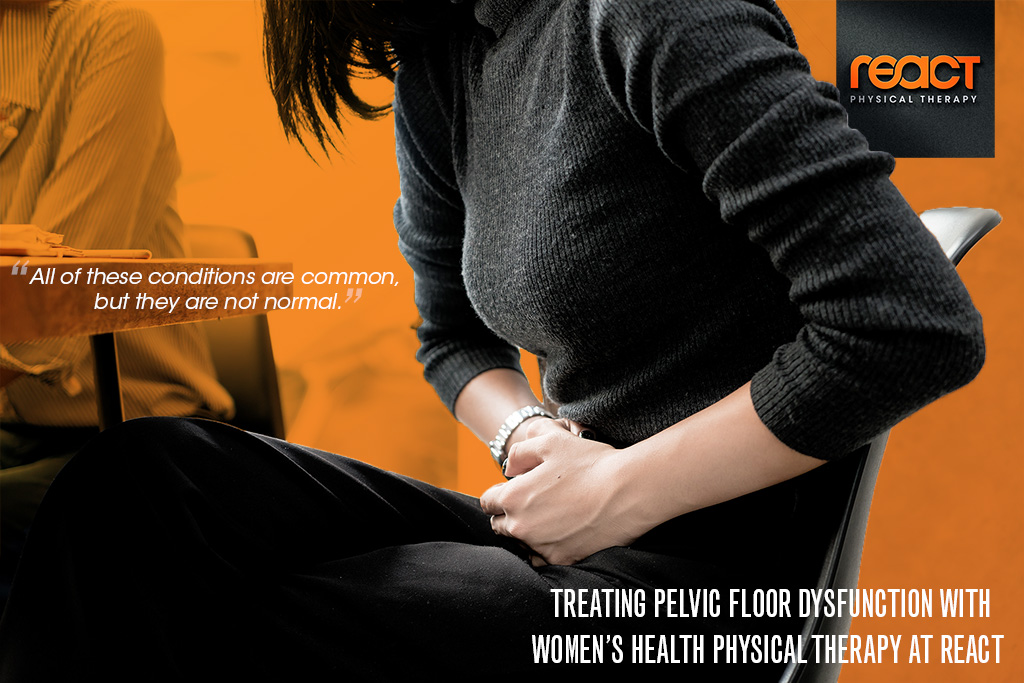What is Women’s Health Physical Therapy?

Maybe you’ve heard of it, but you weren’t sure what it meant. Maybe you were too embarrassed to look it up or ask. Women’s health PT is a specialized area of physical therapy that can encompass A LOT of different diagnoses throughout a woman’s lifespan.
A women’s health physical therapist goes through additional training to evaluate and treat conditions specific to women. These may include:
- Issues during pregnancy and post-partum
- Issues during menopause
- Pain during sexual activity
- Pain lifting a child or even a bag of groceries
- Incontinence or “leaking”
Part of the training that some therapists receive is to perform a pelvic exam to assess the muscles of the pelvic floor (more on this in a bit). While an internal exam may be part of your treatment, it does not necessarily need to be. It’s all depending on your needs. Make sure you talk this through with your therapist. This is extremely beneficial in understanding your condition and creating a plan of care specific to you!
The goal of women’s health physical therapy is to restore normal function, relieve your pains, restore your confidence, and get you back doing the activities you enjoy.
Who needs a women’s health therapist?
Women from all walks of life can experience pelvic floor dysfunction. I see a lot of women post-childbirth, women who are post-menopausal, and every stage in between. Some patients come to me following a car accident, surgery, or sports injury.
Maybe this doesn’t seem to apply to you because you don’t have kids or haven’t been injured or haven’t gone through menopause. Even women who haven’t experienced these changes can have pelvic floor dysfunction. Luckily pelvic floor rehab can provide relief.
What is the pelvic floor?
The pelvic floor is a group of striated muscles that attach from your pubic bone to the coccyx (tailbone) and in between your ischial tuberosities (“sit bones”). It makes up the “floor” of your core, so it has an important role in:
- Support of the pelvic organs
- Closure of the urinary and anal sphincters
- Sexual function
- Posture
These muscles can become dysfunctional (weak, tight, inhibited, etc.) for a variety of reasons. If they do become dysfunctional, it can be the cause of many common diagnoses. These may include:
- Urinary incontinence
- Bowel incontinence
- Pelvic organ prolapse
- Pelvic pain
- Constipation
- Issues during pregnancy and post-partum
- Low back and/or SI joint pain
- And many more diagnoses!
All of these conditions are common, but they are not NORMAL, and they can be treated with physical therapy by a women’s health physical therapist.
Why is this important?
While these conditions are not life-threatening, they can be distracting. Pelvic Floor Dysfunction can interfere with your everyday life and limit your ability to be active and participate in activities.
The good news? Women’s Health Physical Therapy at React Physical Therapy in Chicago can help! There’s no need to be embarrassed. Pelvic Floor Dysfunction is common and treatable. Stop dealing with pain and discomfort. Get relief. By addressing the symptoms and the cause, we can restore strength to your pelvic floor and ultimately free you from the symptoms that keep you from living your best life.
Call 312-929-3646 to make an appointment at our Lakeshore East Chicago location with a Women’s Health Physical Therapy Specialist.